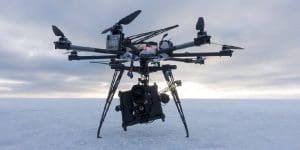The pandemic has affected many careers, not least scientists and researchers who are used to field work. The long lockdown resulted in many discovering new ways to collect and share data. Drones, remotely operated vehicles, satellite imagery, and other technologies have been essential parts of ongoing remote data-collection.
In Antarctica – or, more accurately, not in Antarctica – polar scientists and their postgraduate students also had to find ways to adapt. From drone footage and autonomous vehicles to Zoom conferences and creating online databases for collected research, explore the experiences of six of these scientists in the July 6 article in Nature magazine, “What polar researchers have learnt from the pandemic.”
Read more in Nature, a weekly international science journal first published in 1869. Nature covers topics in all fields of science and technology, with articles from 2012 and forward. Discover news, research articles, editorials, podcasts and videos, and careers in science and tech topics such as biology, weather and climate, marine science, health, animals, environmental science, and much more.
The library offers free access to Nature on the web to all library card holders, no further account or subscription required. Browse recent articles and subject collections, or find the current issue and issue archives under the Explore Content menu. This online journal is a great research tool for high school and higher education students, as well as for anyone interested in the sciences.




